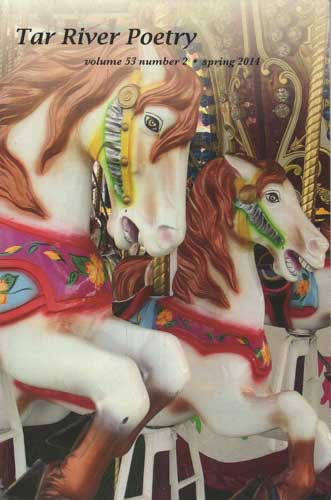Tar River Poetry – Spring 2014
Tar River Poetry, published by East Carolina University, has featured work of established and emerging poets since 1978. This issue follows tradition and includes a substantial number of engaging poems. These predominantly brief, free verse poems are intellectually challenging yet accessible to a wide variety of readers. While these pieces vary in subject and stylistic mode, imagery remains strong throughout the collection. The best poems convey striking images, the kind that stay with a reader long after the last page of the journal is turned. Tar River Poetry, published by East Carolina University, has featured work of established and emerging poets since 1978. This issue follows tradition and includes a substantial number of engaging poems.
These predominantly brief, free verse poems are intellectually challenging yet accessible to a wide variety of readers. While these pieces vary in subject and stylistic mode, imagery remains strong throughout the collection. The best poems convey striking images, the kind that stay with a reader long after the last page of the journal is turned. In Francesca Bell’s “Misconceptions,” prominent images echo against spare lines and elegant music:
The Bible is wrong
about serpents.God’s favor is clear
in the skinshed in one piece
and the snake emerging,vivid as a woman
who slips fromthe stockings between
her and pleasure.
The quietude of the poem’s tone and form both contains and pronounces the erotic intensity of the images.
Elon Eidenier’s “Meandering is Focus” explores the relationship between the artist and the natural world. Eidenier’s potent images illustrate a connection between sensory experience and art. The poem opens with a direct address to the artist:
On which side of your brain do the peonies burst, which ear
hears bees rollick in their open fists? Walk softlythrough quiet wildness of Russian Sage. Swallow sprigs,
spring until you belong. Pansies enjoy being looked at.
Eidenier addresses how one’s perception of an image shapes art, which manifests between introspective and external worlds.
Several poems follow narrative threads and give glimpses into larger stories, often focused on characters that may be marginalized, shunned, even chastised. Steven Cramer’s “Drink” explores the experience of an alcoholic. Coyla Barry’s “Squalor” depicts a teenager who is a victim of parental neglect. Scott Morgan’s “The Autistic Son,” Anna Sutton’s “Letter of Resignation,” and Paul Hostovsky’s “Sunday School” focus on childhood disability.
The poem “Sunday School” illustrates bullying within a class that ideally teaches charity and morality. The images of play against the “slow boy” create a portrait of unjust persecution:
The slow boy wants to know
if God, too, is slow.
Spitballs fill the air.
A few land in his hair
and stick there like burrs
while others glance wetly
off his cheek and fall
to the floor like crumpled
prayers.
[. . .] the teacher goes on
writing the long answer
up on the blackboard
with her back to the class,
and the children reload
the empty barrels of their pens.
Another poem that explores the marginalized character is Christine Kitano’s “Monologue of the Fat Girl,” written in the voice of Louise, Andre Dubus’s protagonist in his short story, “The Fat Girl.” Here the speaker embodies shame. The self-effacing, apologetic tone is evident from the beginning of the poem:
It wasn’t always like this—
At nine, my bathing suit
Stuck to the hollows in my chest, my ribs
were distinct as fish gills. . .But now, night emerges
with its thick tablecloth,
the pregnant moon a tilted
cup of milk.
The doctors say to eat
before the pang strikes,
the ache that calls forth
the white room whose door
I can’t seem to shut . . .
This poem meditates upon the relationship between hunger and shame, a relationship the speaker cannot rectify that culminates in futility and resignation.
This issue ends with book reviews, including Peter Makuck’s “The Past That Haunts,” a comprehensive analysis of Henry Hart’s Familiar Ghosts, and Susan Elizabeth Howe’s essay, “Dark Matter,” which contains brief reviews of James Arthur’s Charms Against Lightning, Jennifer Michael Hecht’s Who Said, and M.B. McLatchey’s The Lame God. This issue of Tar River Poetry makes for an engaging read, especially for anyone who appreciates accessible, image-driven poetry.
[www.tarriverpoetry.com]





